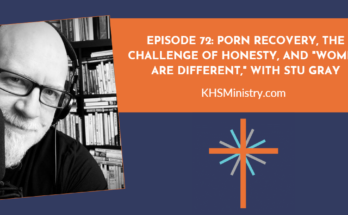By Chris Taylor

For about the first 20 years of our marriage, I sexually rejected my husband quite a bit.
As the frequency and quality of our sex life diminished, he became increasingly distressed. He would express his sadness about the lack of intimacy in our marriage. Looking back, I recognize how vulnerable he was being with me.
At the time, though?
I thought by “intimacy,” he meant sex. When he said, “I’m not experiencing intimacy in our marriage,” I heard, “I’m not experiencing sex in our marriage.” And since I knew he was experiencing some sex, I dismissed his concerns. I believed all he was after was more orgasms.
I had no idea why he was still so upset. As far as I was concerned, the answer was obvious: Work on connecting with me emotionally, and sex will flow from that.
For some of you, this hits too close to home. You know very well that my husband’s desire for intimacy was not about having more orgasms.
But I truly had no clue.
I’m often asked what one thing I wish I’d understood earlier in our marriage. Here is what I always say:
I wish I had understood the emotional aspect of sex for my husband.
I would venture to say that many wives don’t really understand this. Maybe even your wife.
For you, sexual intimacy is about closeness and relationship and not just about the big bang at the end of a sexual encounter.
Why is what’s so obvious to you so invisible to her?
Let’s take a look at some reasons she may not understand. And guys, I’m talking in generalities here. The specifics may not all apply to your own wife, but they may still give you some insight into what is going on in her mind.
We often talk about sex in physical terms.
How we talk about sex matters. And how you communicate to your wife that you’d like to have sex matters a whole lot.
Some approaches that don’t work so well have to do with sex as a physical activity:
He says, “Hey, babe, you want to do the horizontal tango with me?” or “I’m so horny.”
He comments, “Did I ever tell you how awesome your boobs are?”
He gropes her breast or rear.
She catches him masturbating.
Every one of these things is about the physical aspects of sex—position, his erection, her body, or physical release.
Our culture doesn’t help. We have a lot to say about positions, body parts, and the like. However, we don’t talk nearly often enough about the emotional and spiritual aspects of sexual connection.
We have learned negative lessons about sex.
Either through outright teaching or simply absorbing what we observe around us, women are bombarded with messages that diminish our views of sex:
Our bodies aren’t good enough.
All men want is sex (and they want it too much).
Sex is for him.
These messages do not reflect God’s design for sex—and they don’t say anything about the emotional aspect of sex for husbands.
Emotional connection works differently for women.
Many women feel most connected when they engage in conversation with others. Talking about the experiences of the day, sharing feelings, and dreaming and planning together can be wonderful pathways to emotional connection for us. When that kind of connection happens when talking with our husbands, we often want to enhance the emotional connection through a physical connection. Feeling close is what helps us want to have sex. It doesn’t occur to us that there might be a different way.
For men, sex itself tends to be the best pathway to emotional connection. Oxytocin, the hormone associated with human bonding, is most present in men during sex. (See Why Sex? at OysterBed7 for a wonderful explanation.) Sexual activity releases the chemical that helps men feel close.
Many women have heard sex talked about only as a physical experience, have learned negative lessons, and experience emotional connection in other ways.
When she rejects you sexually, she doesn’t mean to reject you. To her, she is just turning down an opportunity for a physical experience.
Knowing that doesn’t remove the sting of her no, though, does it?
What can you do?
I’d like to suggest three things you can do to balance the scales and help your wife understand the emotional aspect of sex for you.
- Talk about sex in terms of emotion, closeness, and oneness. Instead of “We haven’t had sex in three weeks,” try, “I miss being close to you.” Talk about the emotional connection you feel as a result of sex, not just the physical experience of sex.
- Thank and praise your wife for all aspects of who she is. Help her know that you see her wholly, that you value not just her body but also her heart, her nurture, and more.
- Spend time developing intimacy and closeness in the way that is meaningful for your wife. And after sex, don’t just talk about how great your orgasm was. Also be sure you talk about how close you feel to her, or how loved you felt during your time together.





Great post.
I went to a bible study the other day and felt the need to further seek God’s guidance after we read, Proverbs 4:5 “Get wisdom, get understanding: forget it not; neither decline from the words of my mouth.”
God’s timing is perfect even though I’ve been slow to again realize that God is showing that how I “think” really matters. My “thought” can stimulate sin and unforgiveness, but I can also allow my thoughts to avoid sin and be more forgiving and can also stimulate love, kindness and understanding toward others.
God wants me to pursue (and get) wisdom in order to make good decisions as I mentally navigate through life and lovingly in my own marriage. But also to avoid magnifying or fabricating a crisis out of thin air.
I remember reading your testimony awhile back and after reading your post this morning, it occurred to me that because you and your husband chose to navigate through some choppiness, that all along you and he wanted the same thing, though it took a while to discover it.
Sex without emotional connection, trivializes the act of making love and turn the spicy rawness of intimacy into just straight sex.
So to me, your write up and testimony today, goes beyond the desire to have sex, but instead experiencing connection.
I had my own issues and esteem problems from the very beginning and it took me 35+ years of marriage to discover that I had to deal with sin and the pain I endured in life and the pain I transferred to my own spouse. Fortunately we loved each other enough to stay together, as we didn’t want to quit.
I (we) thought our issues stemmed around our cultural and family backgrounds being different but after much prayer and meditation, God exposed those assertions to be false.
What is true, is we didn’t have a set of parents that mentored us, on what it means to “connect” or communicate. In truth their own backgrounds (through no fault of their own) made it impossible for them to witness what it meant to connect by our grandparents. Both our great grandparents experienced sickness, early death and rejection which made it impossible for our grandparents to witness what it means to emotionally connect.
Even so, I don’t think good communication skills are emphasized in our schools and churches, which stacks the deck against having more meaningful relationships.
We live in an “in your face” society. We live in a society where bad behavior is trivialized and goes unpunished while corporations get bailed out. We live in a society where politicians quietly want to control us, our taxes and our way of life and that in itself can cause some serious negative energy to flow through our veins , if we let it.
Through lack of mentoring and me not dealing with the pressures of life combined with my own sin, I had to give it to God and acknowledge, it is on “me” and nobody else
I’ll admit after the first 25 years, I finally initiated the desire what the definition of emotional connection as neither of us didn’t know what it was and never heard of it.
Her sensitive and kind heart was the anchor and yet it still wasn’t happening partly because my own pain was like a shield or armor that was preventing my hardened heart to soften. She was sweet and I was hard and were grasping to our own unique selfish strong holds.
That meant going back to the basics like when we were first met and became infatuated with each other. We had to begin to communicate the right way. Most of us remember how kind and considerate we were to our soon to be spouses. That was a time when it seemed like past pain and strongholds didn’t exist or were released.
After 35+ years, we realized in order to make it work, we had to make the early days of our own courting and dating history, repeat itself over and over again, in real time .
We opened up to each other which caused me to soften as I explained that her diagnosis of me having a negative was actually me carrying a lot of pain because we hadn’t released our own individual strongholds.
This is when we began to have thought provoking conversations and agreed (in advance) that when challenges arise or when voices are elevated one or the other can say with gentle words “we agreed not to talk like this”.
Simply put, we agreed to avoid turning a discussion into an argument which made it much easier to avoid saying mean and insulting things, but instead discover solutions in kind and loving ways.
We are discovering this methodology, is what mutually stimulates the mind. If this is the definition of “brain sex” we are loving it.
The trick is to share the value of communication skills with our adult kids, so the generational curse isn’t passed on to them and to their own kids.
Our kids shouldn’t have to wait years into a relationship to understand how to communicate or what it means to experience how stimulating it is to the mind, to have a discussion without verbally sparring with their own spouse and even their own kids, but instead discover compromise and nurture one another’s heart.
Sorry, if my rambling on is a bit too much on a Saturday.
I think many marriages would’ve survived, if couples understood and pursued “connection”.
We had to begin to communicate in a way where we didn’t fabricate a crisis out of thin air or magnify an issue bigger than it really was. So we opted to agree that when voices elevated or an unkind word was said that one or the other would say “lets don’t go there”.
This made it easier in mutually communicating what was inside our minds and actually discovered that we truly loved what was inside.
When we lack of connection, it seemed to make the intimacy less meaningful.
It’s great that you and your wife were able to figure out a way to prevent major disconnection in your marriage!
Though my wife does not often reject me by saying no, I feel like her body language (i.e. laying there lifeless, looking away when I try to make eye contact, refusing to kiss, etc) is almost more damaging psychologically than if she would have just said no in the first place.
While I know much of this is because she doesn’t want to loose control, it doesn’t prevent me from feeling rejected and even more distanced.
I know that I am not the perfect husband, but I try to better myself where I can. I only post this so that if other men are experiencing this they might not feel so alone.
Thank you for sharing this to help others. Avoiding sex doesn’t come from a place of joy, and neither does avoiding intimacy. Most of the time, both the avoider and the avoided hurt.
I don’t buy it. On the very few occasions I turned my wife down, the first thing out of her mouth was “you don’t love me anymore”.
Both times I was sick. But she turned me down literally thousands of times over the years and I’m supposed to believe she didn’t know what she was doing to me?
Sorry, but that would require her to be truly stupid, which she is not.
We have kids, so I stay. But by her own actions and words, I know she no longer loves me.
It makes no logical sense, I know, but she might genuinely not understand. I say this because once my own husband could have written the same comment. I was not stupid, and I did love my husband. And I truly did NOT understand what I was doing to him.
I was working from my own point of reference that included all the reasons I had so often said no to sex. My reasons for avoiding sex had nothing to do with whether I loved my husband or not. It had to do with mostly my own sexual baggage but also with the ways I felt emotionally neglected by my husband (although I now recognize that my perceptions of that were inaccurate). Because I thought my husband understood what I needed from him in order to want sex, it never occurred to me that he would perceive my “no” as not loving him. I was too busy being hurt by the fact that he kept expecting sex yet hadn’t made any effort to meet my needs.
In most marriages where sex is a problem, both spouses are hurting. Understanding this can sometimes point the way toward healing. I pray that can happen for you and your wife.
~Chris
I appreciate the reply, but you didn’t address the key point. On two occasions, I rejected her advance, and the first thing she said was “you don’t love me anymore.”
This, given the immediacy of the response, shows me that this is how she views sexual rejection.
Took a long time for me to come to grips with that, but it is the only conclusion that makes sense.
To clarify, both times I was quite ill and said so. I literally couldn’t do it. Her rejections don’t have the same conditions.
Many women are shocked to learn that sex has such an emotional component for men. I truly didn’t know that sexual rejection meant to my husband what it did to me. Your conclusion may be the only one that makes sense to you, but that doesn’t necessarily mean it is what is going on with your wife. I wish I could explain it, but when my husband said no and he was ill, my first thought was that he didn’t love me. It never occurred to me that my no mean that same thing to him.
You may be right but don’t underestimate a person’s ability to delude themselves. That’s why Jesus gave the warning about removing the log from our own eye. It seems like it’ should be obvious but it often doesn’t work that way. Unless she’s explicitly told you that she no longer loves you, your assumption might not be a good one.